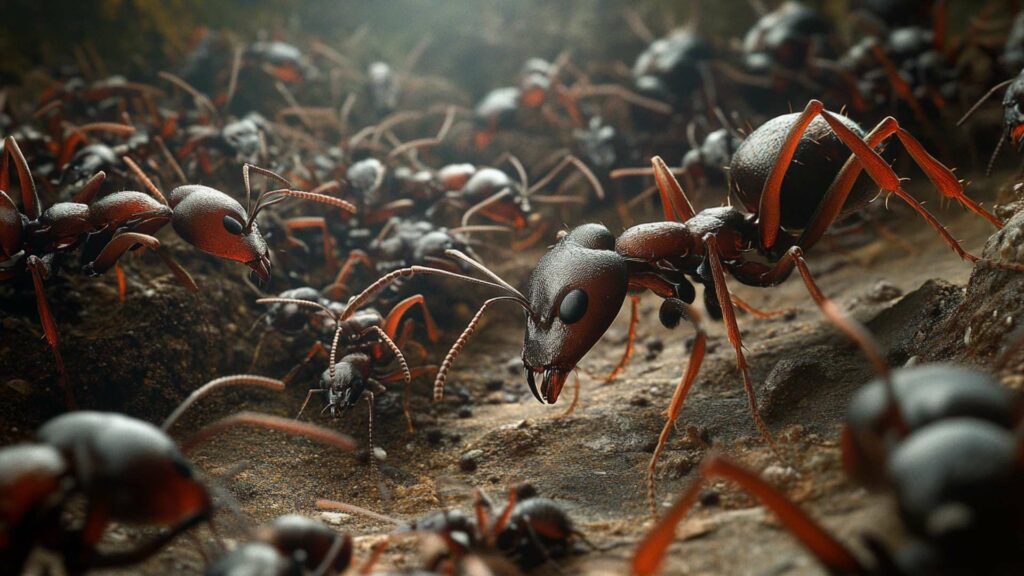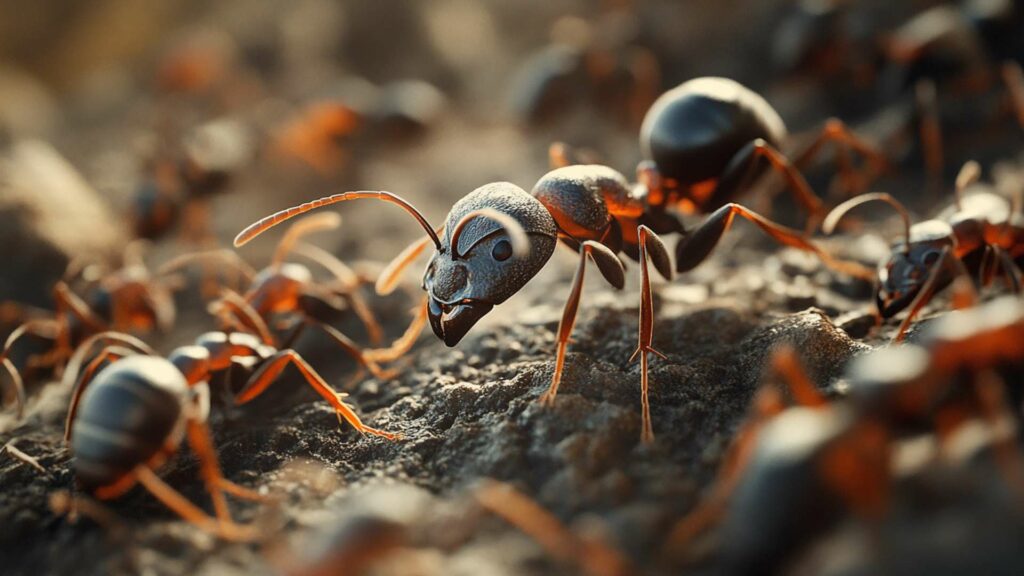Picture this: You’re cruising down the highway, enjoying your favorite tunes, and suddenly you notice a tiny intruder scurrying across your dashboard. Yes, it’s none other than an ant!
A petite problem that can quickly escalate into a major annoyance. Ants in your car can turn a peaceful drive into a frenzied battle against these persistent pests.
But fret not, for I am here to guide you through the process of eliminating these unwelcome passengers from your beloved vehicle. Ants are notorious invaders that will seize any opportunity to infiltrate your car in search of food or shelter.
They are not only bothersome but also have the uncanny ability to establish colonies within the nooks and crannies of your automobile. Once they find their way inside, they waste no time taking over every crevice imaginable – from the glove compartment to the seat cushions.
These tiny intruders can multiply rapidly, turning your serene sanctuary into an ant-infested nightmare. To make matters worse, ants possess exceptional communication skills through pheromones, allowing them to create well-defined trails leading directly to their newfound food source – which could be anything from forgotten food crumbs to half-eaten snacks hiding under the seats.
The more crumbs they discover, the stronger their trail becomes as they recruit more ants from nearby colonies to join in on their feast. But fear not; with proper knowledge and effective strategies at hand, you can regain control of your car and send these pests packing!
Understanding Ant Behavior

Before diving into solutions on how to get rid of ants in your car, it’s essential to understand why these six-legged intruders are so attracted to vehicles in the first place. Different types of ants may invade cars for various reasons.
Some commonly found species include pavement ant hill and ants, odorous house ants, and carpenter ants. Pavement ants, as their name suggests, are attracted to the warmth of the engine compartment during cooler periods.
Odorous house ants have a penchant for foraging ants producing foul odors when threatened or crushed. Carpenter ants, on the other hand, do not necessarily infiltrate your vehicle to build nests but may hitch a ride inside through produce boxes or other means.
Ants are opportunistic creatures with a knack for sniffing out even the tiniest crumbs left behind from your last on-the-go meal. Your car serves as an enticing buffet for them – a convenient source of sustenance in a world of asphalt and concrete.
Even tiny morsels of food crumbs left unattended can lure swarms of these pesky critters into your vehicle. Now that we have gained insight into why ants are so drawn to our cars let’s move on to prevention strategies that will help keep them at bay and preserve our driving sanctuaries.
Understanding the Ants
Types of ants commonly found in cars

When it comes to dealing with ants in your car, it’s essential to understand the different ant species you might encounter. One of the most common types is the pavement ant, also known as Tetramorium caespitum. These tiny ants are typically dark brown or black and love nesting in cracks and crevices within your car’s interior or engine compartment.
Another common intruder is the odorous house ant, or Tapinoma sessile, which can emit a rotten coconut smell when crushed. They are small and brown and often build their nests near moisture sources like air conditioning units or any leaks inside your car.
Reasons why ants are attracted to cars
Ants are naturally drawn to cars due to several factors that make these vehicles an appealing environment for them. One crucial reason is food sources left behind by occupants – dropped crumbs from snacks, spilled beverages on seats, or forgotten fast food wrappers can all serve as a tempting feast for ants.
These resourceful creatures have a keen sense of smell that allows them to detect even tiny particles of food from quite a distance away. Furthermore, cars provide shelter and protection against predators and harsh weather conditions for ants seeking suitable places to build nests.
The engine compartment often offers warmth and safety for certain ant species too. Additionally, if you’ve recently parked near areas where ants commonly reside—such as wooded areas with rotten tree stumps—they might find their way into your vehicle while searching for new territories.
Understanding these aspects will help us develop effective strategies later on in our quest to rid our cars of these pesky intruders. So now that we know more about the types of ants commonly found in cars and why they’re attracted to them let’s dive into prevention methods that will help us repel ants from your car altogether.
Remember, when dealing with ants in your car, it’s crucial to handle the situation promptly before it turns into a full-blown infestation. Let’s make sure we take all the necessary steps to get rid of ants in my car and enjoy a hassle-free ride!
Prevention is Key
Keeping your car clean and free of food debris

To prevent ants from making your car their new home, it’s crucial to keep it clean and free of any tempting food sources. Regularly remove any food wrappers, crumbs, or spilled beverages that might attract these tiny invaders. Vacuuming the interior of your car at least once a week will help eliminate hidden crumbs that could entice ants to explore further.
Don’t forget to pay extra attention to those hard-to-reach spots like in between the seats and under them! In addition to removing visible food debris, be mindful of items that might unknowingly serve as a feast for ants.
Avoid storing open snacks or unfinished meals in your car, as even seemingly harmless items like a half-eaten bag of chips can become a beacon for hungry ants. Moreover, consider refraining from consuming greasy foods inside the car altogether as they tend to leave behind lingering odors that can attract pests.
Sealing potential entry points for ants
Ants are tiny creatures with an uncanny ability to find even the smallest cracks and crevices through which they can infiltrate your vehicle. To prevent them from accessing the inside of your ride, patch up any openings or gaps you come across in the exterior of your car. This could include sealing gaps around windows and doors with weatherstripping or using silicone caulk to fill cracks present on the bodywork.
Another common entry point for ants is through air vents located at the base of windshields or below wiper blades. Placing fine mesh screens over these vents can effectively block ant access while still allowing proper airflow into your vehicle.
Remember, prevention is essential when dealing with ant infestations in cars. By keeping your vehicle clean and minimizing potential entry points, you’ll significantly reduce the likelihood of encountering these unwelcome passengers during your daily commute or weekend road trips.
Natural Remedies to Repel Ants
Using Essential Oils like Peppermint or Lemon
When it comes to repelling ants, essential oils can be highly effective due to their strong scent that ants find repulsive. Peppermint and lemon are two popular options that not only smell great but also work wonders in keeping those pesky critters away from your car.
To utilize peppermint oil as a natural ant repellent, simply soak a cotton ball with a few drops of the oil and place it strategically in areas where ants are commonly found, such as cup holders or under the seats. The strong aroma will deter ants from coming near your car.
Similarly, lemon essential oil can be used in a similar manner. Squeeze some fresh lemon juice into a spray bottle filled with water and spritz it around the interior of your car.
The citrusy scent acts as a powerful deterrent for ants while leaving behind a refreshing fragrance. Remember to reapply the oils or juice every a few hours or days to maintain their effectiveness.
Sprinkling Cinnamon or Coffee Grounds as Deterrents

Cinnamon and coffee grounds are natural repellents that can discourage ants from invading your car. These common household items work by disrupting the scent trails left behind by ants, making it difficult for them to navigate and communicate with each other effectively.
To use cinnamon as an ant deterrent, sprinkle ground cinnamon generously on surfaces where you have spotted ants or suspect they may enter your vehicle through cracks or crevices. Pay close attention to areas near doors, windows, and any openings where ants may gain access.
Additionally, you can create small sachets filled with cinnamon sticks or even use cinnamon-scented air fresheners inside your car for added protection against ant infestations. Coffee grounds serve a dual purpose in keeping both unwanted pests and unpleasant odors at bay.
Strategically place used coffee grounds in small containers around your car to discourage ants from entering. Alternatively, you can sprinkle the grounds on the floor mats or in the trunk of your car to create a barrier that ants are reluctant to cross.
Remember that while these natural remedies can help prevent ants from infiltrating your vehicle, they are not guaranteed to eliminate ants already present. For severe ant infestations, it is advisable to consult with professional pest control services and ensure a thorough cleaning of your car promptly.
Dealing with ants in your car can be frustrating, but there are effective natural remedies available. Using essential oils like peppermint or lemon provides an aromatic defense against these pesky invaders. Additionally, sprinkling cinnamon or coffee grounds deters ants by disrupting their scent trails.
Incorporating these natural methods into your regular car maintenance routine can help prevent ant infestations and keep your vehicle pest-free. Remember to maintain cleanliness within your car and promptly clean up any food crumbs or spillages that may attract ants in the first place.
Combine these preventive measures with the use of natural repellents mentioned above for optimal results. With a little effort and consistency, you can bid farewell to those unwanted six-legged passengers and enjoy an ant-free driving experience!
Homemade Ant Traps and Baits
The Sweet Temptation: Creating a Simple Sugar-Water Ant Trap with Household Items
Ants are notorious for their sweet tooth, and their insatiable appetite for sugary treats makes them susceptible to simple homemade traps. One such trap can be easily made using household items. Begin by finding a small container, like a jar lid or an empty soda can.
Ensure that it is clean and free from any residue that could deter the ants. Then, mix together equal parts sugar and water in a separate container until the sugar dissolves completely.
Next, carefully pour the sugar-water mixture into the chosen container. Place this enticing concoction near areas where ants are commonly found in your car, such as wheel wells or door pockets.
The sweet scent will attract the sugar ants in, luring them towards their impending doom. Once they crawl into the container to feast on the sugary trap, they will find it difficult to escape due to its slippery nature.
Deceptive Elixir: Using Borax-Based Ant Baits to Eliminate Entire Colonies
For those dealing with larger ant infestations in their vehicle, a more potent solution is required. Borax-based ant baits offer an effective means of exterminating these pesky intruders at their source – their colonies. Start your ant bait up by mixing one part borax with three parts powdered sugar in a bowl until well combined.
Now comes the crucial part: place small amounts of this lethal mixture near ant trails or where you suspect nests may be located in your car. The unsuspecting ants will be drawn to the tantalizing blend of sweetness offered by the powdered sugar while unknowingly ingesting lethal doses of borax alongside it.
The borax disrupts their digestive system and ultimately leads to colony elimination as they bring these poisoned treats back to ant colony to share with their unsuspecting peers. Make sure to exercise caution when using borax, especially if you have pets or small children.
Keep the baits out of reach and supervise the application process to ensure safety. Remember, patience is key when using homemade ant traps and baits, as it may take a few days or even a week for these methods to yield significant results.
Professional Pest Control Options
Consulting with an exterminator for severe infestations
When facing a severe ant infestation in your car, it may be time to call in the professionals. While the previous methods mentioned focus on DIY solutions, sometimes the situation calls for expert help.
Exterminators are trained to deal with various pest problems, including ants, and they have the knowledge and tools to effectively eliminate these pesky creatures from your vehicle. Consulting with an exterminator is especially crucial when dealing with severe infestations.
If you’ve tried multiple DIY remedies but find that more ants keep appearing or if you’re dealing with aggressive carpenter ants that can cause significant damage, it’s best not to delay seeking professional assistance. A thorough inspection by an experienced exterminator will help identify the extent of the problem, locate hidden ant nests or pheromone trails, and determine the most effective course of action.
Exterminators have access to specialized treatments that are not available over-the-counter. They may use targeted insecticides or employ advanced techniques like fumigation to eradicate ants from your car completely.
Additionally, they can provide valuable advice on how to prevent future ant invasions and offer tips on maintaining a pest-free vehicle. Remember that when consulting an exterminator for your car’s ant troubles, it’s essential to choose a reputable and licensed pest control professional who specializes in treating automotive pest issues.
Seek recommendations from friends or do some research online before making a decision. Working together with an expert will ensure you receive tailored solutions specific to your situation while saving you time and effort in getting rid of those persistent ants once and for all.
Unconventional Methods (for desperate times)

Freezing the affected area to kill ants instantly
When all else fails and you find yourself in desperate need of an immediate solution to a persistent ant problem in your car, consider using the power of extreme cold. Freezing the affected area is an unconventional yet highly effective method for killing ants instantly. Begin by identifying the specific location where all the ants are are congregating, such as a cup holder or a crevice in your car’s interior.
Once identified, procure a can of compressed air or a cryogenic freeze spray from your local hardware store. These products are designed to rapidly cool surfaces upon contact.
Aim the nozzle directly at the ant-infested area and press the trigger, ensuring that you cover all visible ants underneath a deep freeze of intense cold. In less than an hour, this chilling intervention of ant spray will effectively eliminate ants on contact and halt their invasion.
Conclusion
Dealing with ant infestations in your car can be frustrating and challenging. However, armed with knowledge about how to get rid of ants in a car using various methods – from prevention techniques to natural remedies and professional interventions – you can regain control over your vehicle and enjoy an ant-free environment once again.
Remember to clean your car regularly, seal any potential entry points for ants, and utilize homemade traps or professional pest control options when necessary. And in desperate times when immediate action is required, freezing affected areas can provide instant relief from pesky ants.
By implementing these strategies and staying vigilant against future invasions by these little insects, you will not only eliminate current ant problems but also potentially prevent new ones from occurring altogether. So don’t let those worker ants ruin your driving experience; take charge today and reclaim your car as an ant-free zone!
Dissuade Ants with D-Termination: The Top Pest Control Service in Las Vegas!

If you’re grappling with ant problems, don’t worry. D-Termination is here to lend a hand. Our expert team excels at discouraging ants, revitalizing cleanliness, and restoring the integrity of your space. Bid farewell to ants—opt for D-Termination for highly effective pest control today!
Reach out to us at 702-919-6310 or visit dtermination.com to schedule your ant control service and regain your space from these unwelcome pests.
Frequently Asked Questions:
Quickly remove ants from your car by cleaning thoroughly, using ant baits, and sealing entry points.
Ants in a car may leave if you remove their food sources, but it’s best to take action to get rid of them.
Difficulty in removing car ants could be due to leftover food or entry points; a thorough cleanup helps.
The best ant killer for cars is typically a bait trap designed for indoor ants; place it strategically inside your vehicle.








